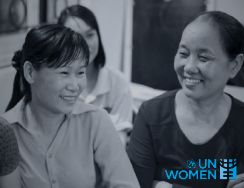Thailand
| Date of Accession/ Ratification: | 9 Aug 1985 |
| Reservations: | Article 29 (1) |
| Optional Protocol: | Ratified 14 June 2000 |
| Reporting Status: |
|
| Shadow reports | Thailand’s Second NGO Alternative Report submitted by CEDAW NGO Report Working Group |
| Concluding Observations | Concluding observations from 34th session |
| Coordinating Agency for CEDAW implementation: |
|
Thailand (Kingdom of Thailand) is a constitutional monarchy, where its society and politics have been largely shaped by religion, the military and the hereditary royal family. Political turmoil struck in 2005, leading to a bloodless military coup that ousted the elected government in September 2006. The political uncertainty continued into 2007, with the military junta establishing an abbreviated interim constitution, banning all political activities and appointing a committee to draft a new constitution, a process that provoked criticism and controversy among the Thai populace. The new constitution was finally approved by referendum in August 2007, paving the way for a return to democratic elections, which took place in December 2007. In July 2011, Thailand elected its first female Prime Minister—Yingluck Shinawatra which women’s groups hoped would boost women’s empowerment initiatives, particularly in regards to increasing women’s representation in decision-making. However, controversy has followed Shinawatra and there continues to be political upheaval in the country.
| Adopted legislation | Ratified international human rights treaties |
|
|
Figure 1: Legislative measures and international human rights treaties ratified since Thailand’s last session with CEDAW in 2006
Thailand is ranked 103 out of 187 countries and territories on the Human Development Index, and falls above the medium human development average, and the average for East Asia and Pacific countries. The right for women to exercise their freedoms is restricted due to discriminatory provisions within Family Law. Women are not compensated if they are raped by their betrothed husband; girls between 13-15, with their parents consent, can marry a man who has had sexual intercourse with her; women can only legally file for a divorce if they can prove their husband supports and honours another woman as his wife. Women are also stereotyped in relation to family planning, where there are low levels of contraception used by males compared to female methods of contraception, which often leads to unsafe abortions.
| Multidimensional Poverty Index Rank – MPI – (of 104 countries) – ‘head count’ (%) | From 2005/2006 survey: 1.6 |
| Gender Inequality Index Rank – GII – (of 148 countries) | In 2012: 66 |
| Social Institutions and Gender Index – SIGI | In 2009: 16 (of 102 countries) In 2012: 25 of 86 countries) |
As Thailand is notorious for their sex tourism industry, legislative measures have been taken to combat human trafficking, however, the trafficking and exploitation of women and girls continues to be ongoing, with high rates of HIV/AIDS. Thailand’s rural and hill tribe women face limited access to education, adequate nutrition, sanitation, health-care services and employment opportunities with fare wages. Similarly, Muslim women in Thailand’s south also do not have access to these rights, and in an area of unrest and conflict, their security is of concern. Many refugee women also do not any enjoy legal status in the country. More information at CEDAW in Action - Thailand.
Supported by:
Latest news
At a glance

Getting to know more about CEDAW and the Regional Programme in Southeast Asia | CEDAW Brochure